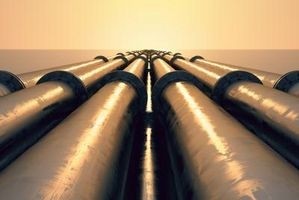Pipeline Safety Inspector Qualifications

Pipelines transport hazardous materials. These materials are important to the daily lives of many. “Approximately 70 percent of liquid fuels (oil, gasoline, jet fuel, etc.) and nearly all natural gas are delivered to our communities, businesses and industries by pipelines,” reports the U. S. Department of Transportation in a 2012 pipeline safety update. The report also says that pipelines are safe delivery systems, but more safety checks are needed. That’s why pipeline safety inspections are a priority. To make a difference, pipeline safety inspectors must meet certain qualifications.
Rules and Procedures
A primary goal of inspections is to evaluate compliance with pipeline safety rules. As such, a strong working knowledge of these rules is a major inspector qualification. Additionally, safety inspectors must know enough to recognize safety issues, evaluate them and suggest corrective actions or abatement procedures. To do this properly, pipeline safety inspectors must be familiar with standard operating procedures and guidelines that apply to pipeline transport systems. For example, inspectors must understand methods used to detect leaks in order to assess related safety problems or issues.
Pipeline 101
Having basic knowledge about the pipeline transportation industry is another inspector qualification. This means knowing how pipeline distribution systems are designed, constructed, operated and maintained. This includes basic awareness of general engineering practices, construction codes and specifications, underground pipe protection systems and structural integrity measures. This knowledge better equips inspectors with the ability to recognize problems, defects and issues during an inspection. Being familiar with the industry also allows inspectors to make legitimate improvement suggestions.
Inspection Protocols
Qualified pipeline safety inspectors know how to conduct inspections. They can comfortably execute all inspection protocols, including field interviews and observations. They are capable of accurately documenting information collected for the final report preparation. Pipeline safety inspectors also understand how to verify findings with adequate records. If field measurements are needed, such as pipeline leak testing, inspectors know what tools and equipment to use. A qualified safety inspector knows how to compile a lot of data into a final inspection report with key findings and recommendations.
Education and Expertise
Qualified pipeline safety inspectors normally have years of experience, although one year is enough to qualify to take the American Petroleum Institute's piping inspection program exam for those with a bachelor's or higher degree, according to the institute. Those with an associate’s or bachelor’s degree are typically favored for employment. In terms of experience, hiring companies lean towards inspectors with five to 10 years of experience in a related industry. A combination of training and experience is usually acceptable in lieu of formal education requirements. Successfully completing a reputable pipeline inspector certification program is also a plus.
Rules and Procedures
A primary goal of inspections is to evaluate compliance with pipeline safety rules. As such, a strong working knowledge of these rules is a major inspector qualification. Additionally, safety inspectors must know enough to recognize safety issues, evaluate them and suggest corrective actions or abatement procedures. To do this properly, pipeline safety inspectors must be familiar with standard operating procedures and guidelines that apply to pipeline transport systems. For example, inspectors must understand methods used to detect leaks in order to assess related safety problems or issues.
Pipeline 101
Having basic knowledge about the pipeline transportation industry is another inspector qualification. This means knowing how pipeline distribution systems are designed, constructed, operated and maintained. This includes basic awareness of general engineering practices, construction codes and specifications, underground pipe protection systems and structural integrity measures. This knowledge better equips inspectors with the ability to recognize problems, defects and issues during an inspection. Being familiar with the industry also allows inspectors to make legitimate improvement suggestions.
Inspection Protocols
Qualified pipeline safety inspectors know how to conduct inspections. They can comfortably execute all inspection protocols, including field interviews and observations. They are capable of accurately documenting information collected for the final report preparation. Pipeline safety inspectors also understand how to verify findings with adequate records. If field measurements are needed, such as pipeline leak testing, inspectors know what tools and equipment to use. A qualified safety inspector knows how to compile a lot of data into a final inspection report with key findings and recommendations.
Education and Expertise
Qualified pipeline safety inspectors normally have years of experience, although one year is enough to qualify to take the American Petroleum Institute's piping inspection program exam for those with a bachelor's or higher degree, according to the institute. Those with an associate’s or bachelor’s degree are typically favored for employment. In terms of experience, hiring companies lean towards inspectors with five to 10 years of experience in a related industry. A combination of training and experience is usually acceptable in lieu of formal education requirements. Successfully completing a reputable pipeline inspector certification program is also a plus.
- m14b7b4eedcfd3ba9839c6de0f289987d0.jpg
References
http://www.ehow.com/facts_7739095_pipeline-safety-inspector-qualifications.html
http://img.ehowcdn.com/article-new-thumbnail/ds-photo/getty/article/225/147/178573908_XS.jpg